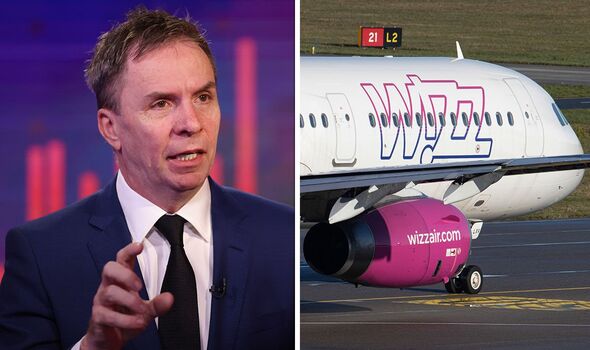WizzAir CEO Jozsef Varadi has issued a defiant message to “socialists” as he pledged to trouser a bonus worth more than £2million, despite falling customer ratings and a plunging share price.
The Hungarian-border executive earns over £710,000 and is in line for a ‘one-off’ bonus worth 300 percent of that salary – amounting to £2.1 million.
This follows a year in which the budget airline was rated worst for customer service for the third consecutive year, while its stock price dipped as low as 1,240p today, down from a peak of over 2,500p in June, and a long way short of the CEO’s 12,000p target.
If Mr Varadi manages to reverse the company’s fortunes and achieve 12,000p per share by 2028, he stands to receive a £100 million payout – but at the moment that looks like a long shot.
Despite WizzAir’s struggles, Mr Varadi – who rose to the top of the multi-million-pound business after being inspired by his father’s struggles during the Hungarian uprising – brushed off criticism over his bumper pay package, telling City AM: “Look at the United States… I don’t know what bonus Elon Musk took, but he took billions.”
At the company’s recent AGM, almost one in five voted against Mr Varadi’s reward package, while more than one-third voted against the broader remuneration policy.
Undaunted, the CEO, who rose from humble beginnings, declared the meeting an “absolute victory”, taking a swipe at what he called “socialist agencies” in the process.
He added: “I would say that it was an absolute victory because despite the socialist view imposed by the proxy agencies, we actually gained shareholder confidence, and shareholders voted in favour of the resolution by a comfortable margin.”
Shareholders appear less convinced – as the stock market opened this morning, shares dipped by more than two per cent.
Mr Varadi’s father was briefly jailed and blacklisted from stable work as a result of his involvement in the 1956 Hungarian revolution, which was brutally crushed by the Soviet Union.
With his father only able to find occasional employment, his mother worked in a factory to support the family until their son won a scholarship to attend one of Hungary’s top universities.
Discussing his early life previously, he described his father as having “much more potential than he was able to fulfil given the circumstances, and perhaps that became a driving force in me. I felt I needed to prove we were worth more than the hand he was dealt”.
After graduating from university, Mr Varadi worked for Procter & Gamble ten years between 1991 and 2001. He then joined Malev Hungarian Airlines, and was appointed CEO in 2003.
Wizz Air was rated the worst airline for customer service for the third year running by Which?, a verdict Mr Varadi disputes.
He said: “We believe it’s completely unfair. We looked into the methodology… the sample size and its representation.
“We’ve made huge investments in the company, particularly in the UK. The average age of our UK fleet is just one year.”
The CEO has also been accused of fostering a culture in which pilots are encouraged to fly extra shifts despite feeling tired.
Nevertheless, he remains popular – at last week’s AGM, more than 99.7 per cent of attendees voted in favour of re-electing him as a director.
